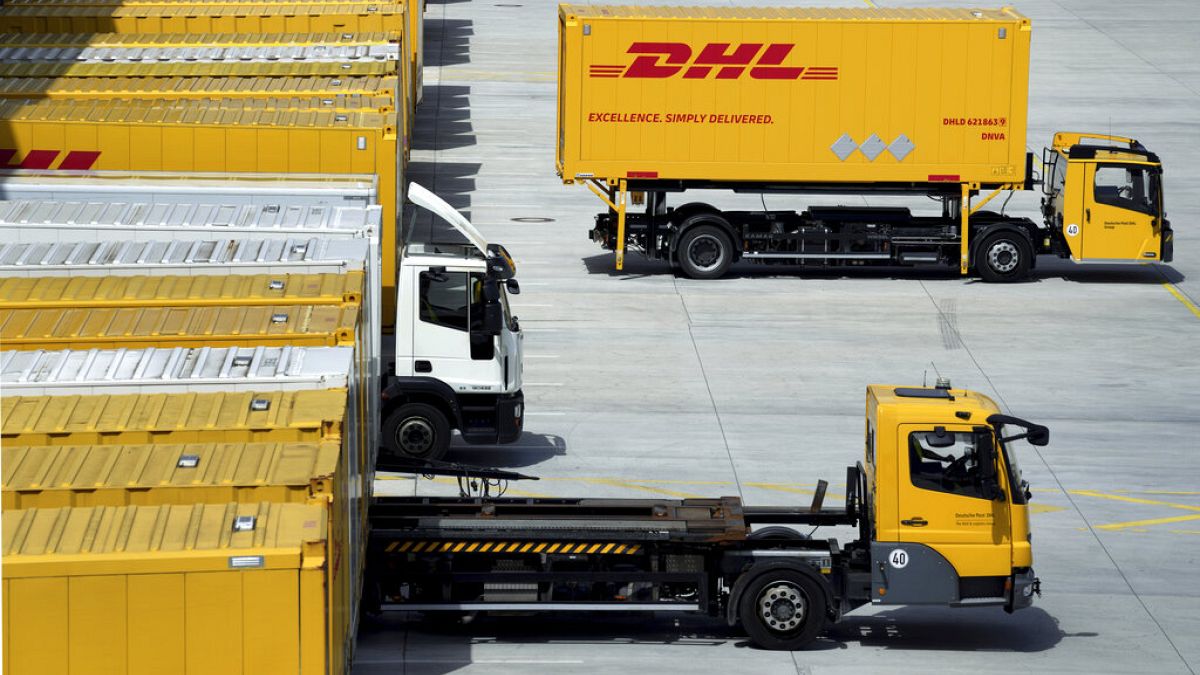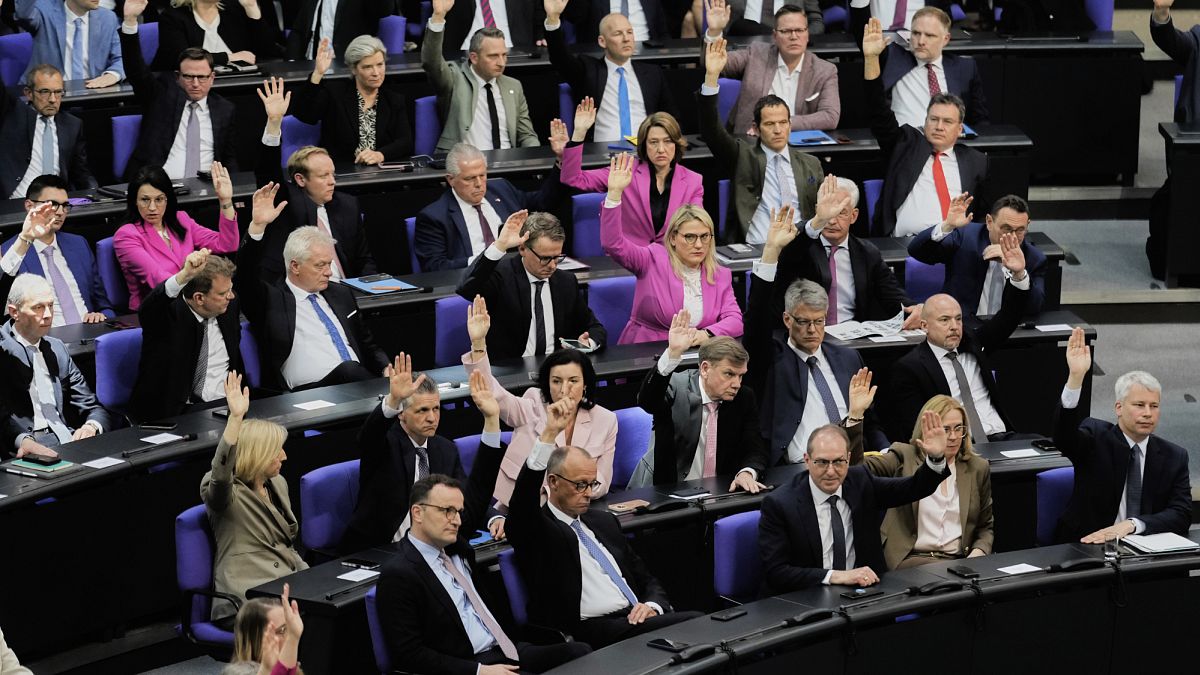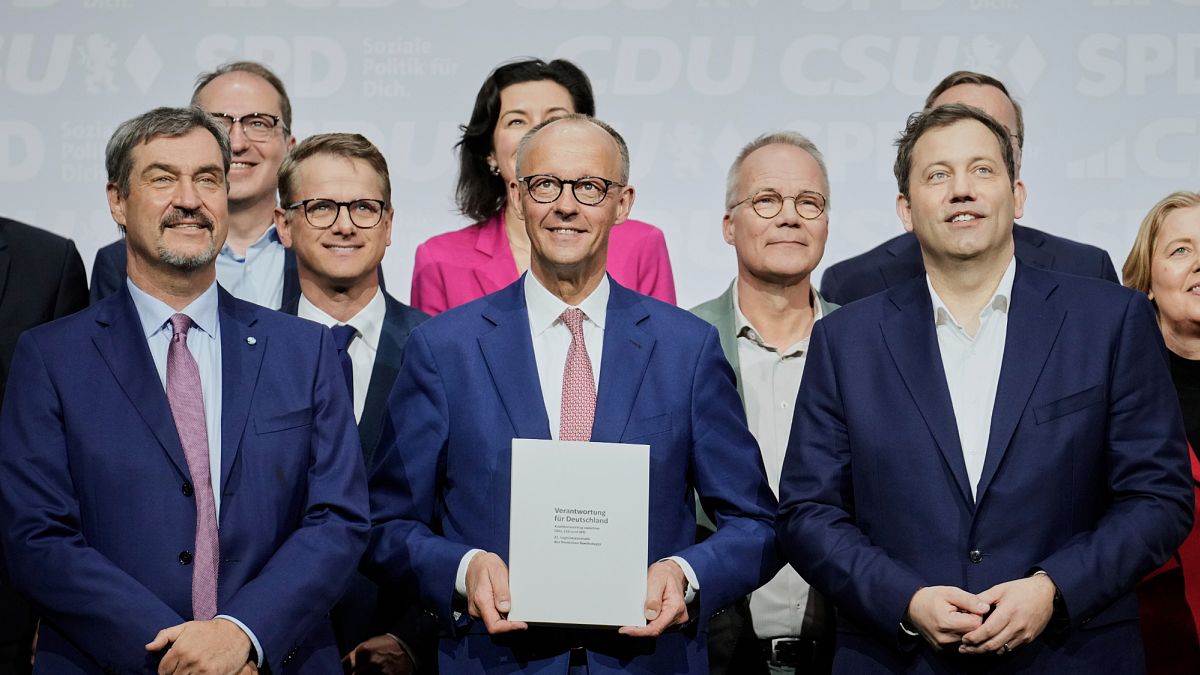How a Trump win could result in a billion euro trade war for Germany

An escalating trade war, which may occur if Donald Trump is re-elected for a second term as the US president, could mean a loss of billions for Germany’s economy, according to a report.
With the 2024 US elections drawing closer, speculation of an escalating trade war between the EU and US is growing, especially if former president Donald Trump is elected again. This could significantly impact Germany, as the US is one of the country’s biggest trading partners.
This is mainly because Trump has already shared that tariffs on US imports may be hiked up to 10% or potentially even 20%, should he come back into office.
A reportby the German Economic Institute (IW), shared with Euronews Business in an email, outlined how a rising trade war could hit Germany in two potential scenarios.
The first scenario outlines what would happen if Trump raises tariffs on all US imports to 10%, and tariffs on goods imported into the US from China to 60%, starting from 2025. In this case, it is likely that the EU would also retaliate with a tariff of 10% on goods imported into the bloc from the US.
The second scenario highlights an even more serious trade war, where both the EU and the US impose tariffs of 20% on each other.
How could higher US import tariffs affect the German economy?
The value of German exports to the US amounted to about $171.65bn (€158.75bn) in 2023, according to the United Nations Comtrade Database. In 2022, some of the key German goods imported by the US were packaged medicines, cars, blood, vaccines, antisera, cultures and toxins.
On the other hand, Germany imported around $76.47bn (€70.70bn) from the US in 2023. Some of the main products were vehicles, optical and technical equipment, electrical and electronic equipment, mineral fuels, aircraft, pharmaceuticals and spacecraft.
These sectors could potentially be significantly impacted in the event of an escalating trade war between the EU and the US.
In the first IW scenario, over Trump’s four-year term, in case of re-election, Germany could experience a loss in gross domestic product (GDP) of over €127bn, which is calculated in constant 2020 prices.
In the second scenario, the German economy could possibly lose about €180bn, which could translate into a 1.5% fall in GDP by the end of Trump’s four-year term. In this case, the EU-27 would see a GDP loss of about 1.3%.
A significant collapse in private investment is likely to be the main cause of this declining GDP, however, private consumption is not likely to be much impacted.
Germany is also more likely to be impacted by trade tensions, as it relies very highly on exports as a whole, whereas the US is somewhat more self-dependent, as a larger and more economically secure country.
According to Fitch Ratings, on its website: “US tariffs would exacerbate existing growth challenges in Europe, particularly for Germany’s export-oriented economy, which is already facing cyclical and structural shifts.
“This could negatively affect eurozone growth and widen the economic performance gap with the US. The added growth risk could also strain public finances, making it difficult to meet deficit and debt targets.”
Other European countries, such as Italy, France and Spain are also likely to face tariffs on exports to the US, according to Fitch Ratings, which estimates the rate of these tariffs to be between 1% to 2.6%.
The highest rate is likely to be applied to Italy, as it exports goods like footwear, apparel and other luxury items, which face more individual tariffs.
However, the most tariffs are likely to be slapped on goods with smaller values, while higher value goods could see fewer tariffs.
Is a retaliatory tariff by the EU the right measure?
Thomas Obst, senior economist of International Economic Policy, Financial and Real Estate Markets Research, at IW, said in the report: “A transatlantic trade war is negative for both sides. Especially for the German export industry, which is already in crisis.”
In case of the US raising tariffs, the EU also choosing to do so could be helpful, as it could potentially prevent a trade war from going on for too long or causing too much damage.
Dr. Samina Sultan, senior economist for European Economic Policy and Trade, noted in the report: “At best, the EU’s threatened retaliation would be enough to put Trump in his place. It must also be clear to both partners that a partnership on equal terms strengthens both sides’ positions vis-à-vis China.”
However, retaliatory tariffs from the EU could also backfire, as the bloc’s economy as a whole could be impacted by rising US tariffs, if the trade war worsens. These could exacerbate issues caused by soaring inflation, high interest rates and weak growth that the EU has been battling with since the pandemic.
The recent increase in EU tariffs on Chinese electric vehicles has also meant that the bloc is facing a trade war with China now, which has retaliated with its own investigations into imports of brandy, dairy and pork items from the EU.
As such, it is even more vital for the EU now to maintain good trade relations with other partners. This includes the US, as well as potential new partners, such as Latin American countries, or other Southeast Asian countries, to strengthen its global position.
Source: Euro News















